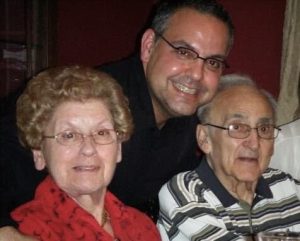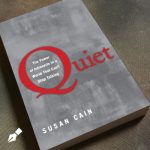As a Founder Leader, You Must Know What Matters and Live It
“Nothing happens… But first a dream.” ~ Carl Sandburg
by David Casullo author of Leading the High-Energy Culture: What the Best CEOs Do to Create an Atmosphere Where Employees Flourish
The organization of which you are a part was formed by someone. It was conceived first in someone’s mind as a vision shaped by that person’s personal truths. Something inside him/her prompted action – a defining moment – and the concept began to take shape. The company was born.
Just as with individuals, organizations have an inherent energy. The stream of resonating energy in your organization is already flowing.
Unless you are the founder, this has occurred largely outside of your influence. This energy was formed by the personal truths of the founder, enhanced by other leaders along the history of the company, and now exists within the atmosphere of the organization’s culture. This energy has a synchronizing effect on the actions of the people in your organization. It’s the natural state, just as with the pendulums of the Huygens’ clocks or with two people walking on a journey. Your organization is comprised of people who are in lockstep in some way, in some cases, unfortunately, not a good way.
If you are the founder of your organization, it may shock you to learn that your people’s ability to realize their potential is impacted most by your actions. Their highest level of being is determined, in part, by your behavior. The founder leader’s responsibility is vastly more important than just driving results. Many leaders can deliver results without aligning the frequency of their energizing vibrations with the talented people in the organization. The results in this case tend to be short-term, and are often far below where they might otherwise be if resonance is present. Researchers Pfeiffer and Sutton write: “One of the main lessons from organization theory and leadership research is that leaders exercise the greatest personal influence over a company or group when it is young, small, or both. That is why company founders have such a strong and often enduring impact on the long-term success of a company, as well as its culture, values, and way of operating.”
As a founder, you must know what matters and you must live it. The consequences – both good and bad – are in your control. In every way a successful business flourishes, we can look and find the founder’s fingerprints.
Want to learn more?
The Founder’s Fingerprints – An Upstate NY Legacy worth mimicking
When Bob Wegman passed away in April 2006, the supermarket industry grieved the loss of one of its legendary pioneers. During his 56-year reign, Bob’s leadership made Wegman’s Supermarkets the benchmark for the industry. Bob was instrumental in pioneering the use of the Universal Product Code (UPC) technology that is ubiquitous today. But that’s only one example of how his remarkable pioneering spirit helped set his company apart. Bob’s vision included the “superstore” and the “one-stop shop” concepts. By the early 1990s, a typical Wegman’s store was described as a “visit to the global village.” Their stores were 100 times the size of the typical 1,200-square-foot stores the competition had operated for decades. Wegman’s shoppers were able to purchase imported cheeses, select from restaurant-quality prepared foods, or enjoy a pastry and a latte in the store café. Wegman’s was one of the first grocers to have an in-store pharmacy, a photo lab, and a video store. Shoppers with small children could comfortably let them play in the supervised child care center while they shopped. In 1994, The Wall Street Journal called Wegman’s “…the best chain in the country, maybe in the world.”3 Since then, Wegman’s has been included in Fortune magazine’s list of the “100 Best Companies to Work For” ten times and was ranked #1 in 2005.
What was the source of Bob Wegman’s bountiful energy? Bob credited his father, Walter, and his Uncle Jack for instilling in him the values of quality, customer service, and treating employees right. Bob pushed his standards to the highest levels because of the personal truths his dad and uncle instilled in him. Walter and Jack had opened their first store in 1930, combining their merchant skills in an enterprise shaped by their experience in the smallest of family businesses. Bob’s dad had helped his grandmother operate a small store out of the front of their home, and his uncle had been a “huckster.” Before acquiring the negative connotation it carries today, the term “huckster” once simply described a merchant who purchased products from the public market early in the day and then peddled the various fresh products from a cart all day long.
As you can imagine, merchandising was in Bob’s blood. He was always driven to find ever-more innovative ways to satisfy the customers and make the Wegman’s shopping experience memorable. His most famous speech was for a food industry conference in Thailand in 1961. It is often referred to as his “I am a merchant” speech. Even now, leaders and employees at Wegman’s still refer to this speech, which has become the framework for Wegman’s operating philosophy, summed up by the statement “Every Day You Get Our Best!” This remains the rallying call for the energized culture that is Wegman’s today.
Bob Wegman embodies the reason Wegman’s culture is so unique, and so successful. To understand Bob, his history, and his story is to understand Wegman’s fundamental truths – the foundation on which the company is built.
Danny Wegman, Bob’s son, led Wegmans for decades and then named his daughter Colleen Wegman CEO and President. Colleen carries the torch that was ignited long ago inside her great-grandfather’s and great-uncle’s hearts. Her father Danny aligned his personal truths with those of his grandfather and his uncle because his dad behaved in alignment with them. Because they resonated with his personal truths, they are now instilled in his adult children.







